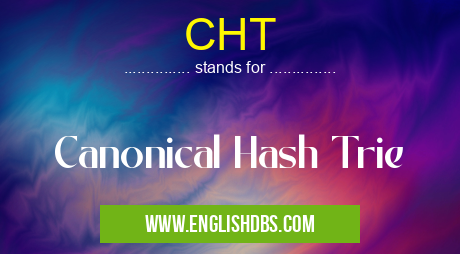What does CHT mean in UNCLASSIFIED
CHT stands for Canonical Hash Trie. It is a data structure used in networking and distributed systems to efficiently store and retrieve data.

CHT meaning in Unclassified in Miscellaneous
CHT mostly used in an acronym Unclassified in Category Miscellaneous that means Canonical Hash Trie
Shorthand: CHT,
Full Form: Canonical Hash Trie
For more information of "Canonical Hash Trie", see the section below.
How CHT Works
A CHT is a hierarchical data structure that organizes data into a tree-like structure. Each node in the tree represents a portion of the data stored in the CHT. The data is stored in the leaves of the tree, which are the nodes at the bottom of the hierarchy.
To insert data into a CHT, the data is hashed using a cryptographic hash function. The resulting hash value is then used to determine the path to the leaf node where the data will be stored.
To retrieve data from a CHT, the same hash function is used to generate a hash value from the search key. The resulting hash value is then used to determine the path to the leaf node where the data should be located.
Benefits of Using CHT
CHTs offer several benefits, including:
- Efficient data storage and retrieval: CHTs provide a fast and efficient way to store and retrieve data, even for large datasets.
- Data integrity: The use of cryptographic hash functions ensures the integrity of the data stored in a CHT.
- Scalability: CHTs can be easily scaled to handle large amounts of data by adding more nodes to the tree.
- Fault tolerance: CHTs are fault-tolerant, meaning that they can continue to operate even if some of the nodes in the tree fail.
Essential Questions and Answers on Canonical Hash Trie in "MISCELLANEOUS»UNFILED"
What is Canonical Hash Trie (CHT)?
Canonical Hash Trie (CHT) is a data structure used in Ethereum Virtual Machine (EVM) to efficiently verify transaction receipts and store data within smart contracts. It is a hash-based trie structure that maps keys to values, where the keys are hashed using a cryptographic function to ensure uniqueness. CHTs are optimized for fast retrieval and validation, making them suitable for blockchain applications where data integrity and efficient data access are critical.
How does a CHT work?
A CHT consists of a set of nodes that are linked together in a tree-like structure. Each node contains a key-value pair, where the key is the hash of the value and the value can be any type of data. When a new key-value pair is added to the CHT, it is inserted into the tree by hashing the key and using the result to determine the path to the appropriate node. The value is then stored in the node, along with the key's hash. To retrieve a value from the CHT, the key is hashed and the result is used to navigate the tree to the node containing the value.
What are the advantages of using a CHT?
CHTs offer several advantages:
- Efficiency: CHTs allow for fast retrieval and validation of data, making them suitable for blockchain applications where performance is critical.
- Security: The use of cryptographic hashing ensures the integrity and authenticity of the stored data, making it difficult to tamper with or forge data.
- Scalability: CHTs can handle large volumes of data efficiently, making them suitable for blockchain applications that require the storage and processing of large datasets.
Where are CHTs used?
CHTs are primarily used within Ethereum Virtual Machine (EVM) smart contracts, where they are employed for:
- Transaction receipt verification: CHTs are used to efficiently verify the validity of transaction receipts, ensuring that transactions have been executed correctly and the data contained within them is accurate.
- Data storage and retrieval: CHTs can be used to store and retrieve data within smart contracts, providing a secure and efficient way to manage data on the blockchain.
Final Words: CHT is a powerful data structure that offers several benefits for networking and distributed systems. Its efficient data storage and retrieval, data integrity, scalability, and fault tolerance make it a valuable tool for managing large amounts of data.
CHT also stands for: |
|
| All stands for CHT |
